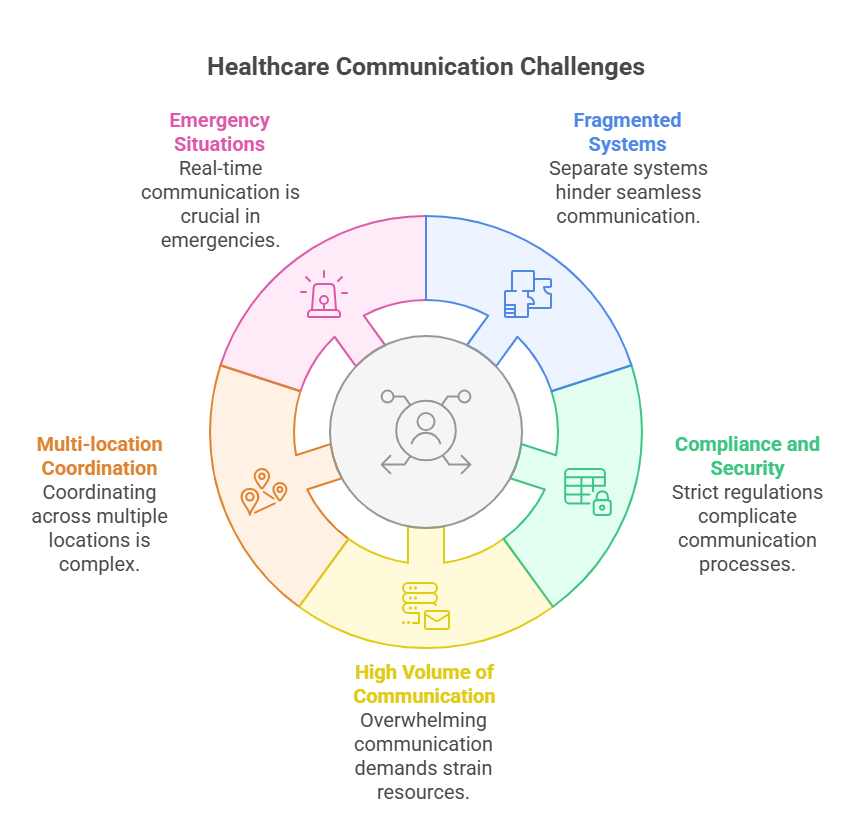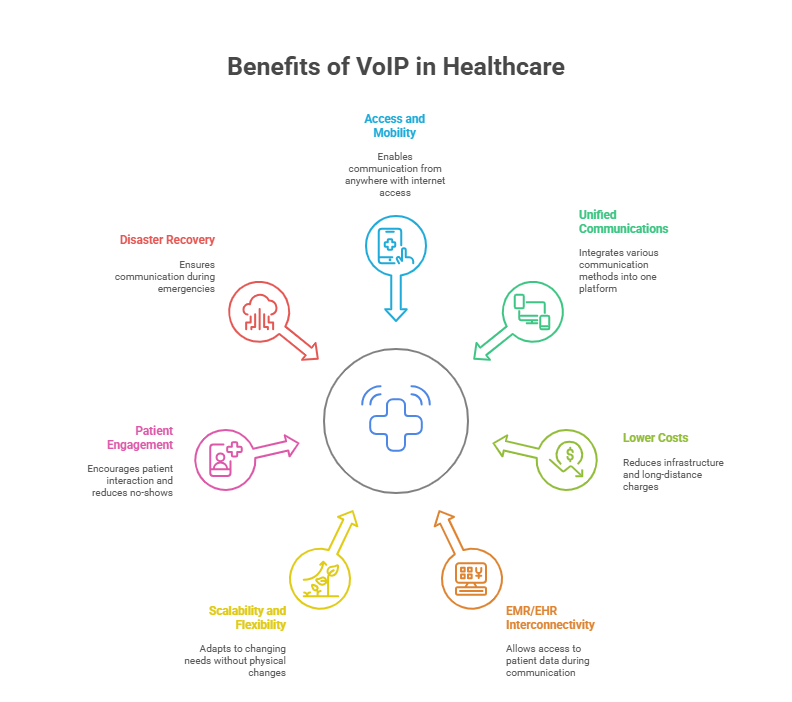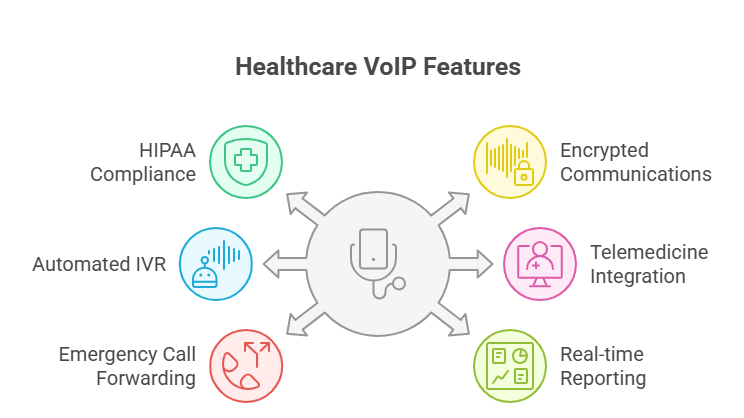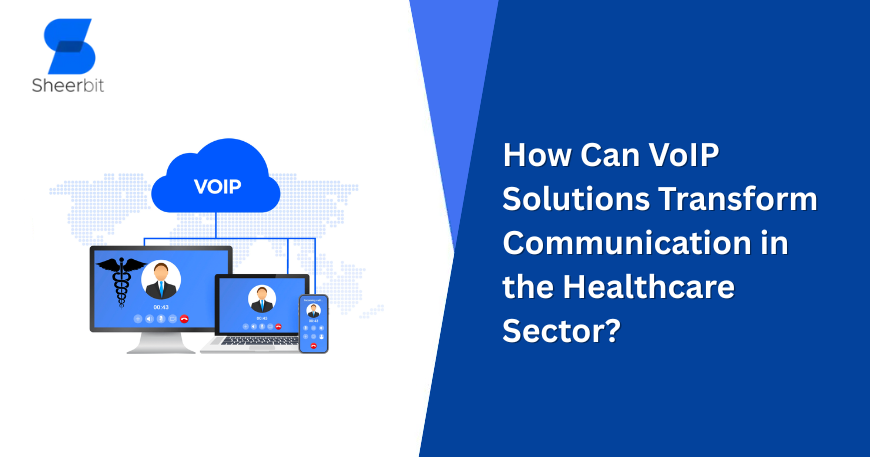Quick Summary
Voice over Internet Protocol (VoIP) lets users make voice calls via a broadband internet connection rather than a traditional (or analog) phone line. In healthcare, VoIP doesn’t just enable voice calls – it also includes video conferencing, secure messaging, appointment reminders, EMR connectivity, and even telemedicine platforms.
By using the internet to pass communications data, VoIP solutions can significantly reduce costs, enhance accessibility, and support integration with other application software systems in healthcare.
Index
- Introduction
- What is VoIP in Healthcare?
- Primary Communication Difficulties in the Healthcare Sector
- Benefits of Customized VoIP Solutions in Healthcare
- Features Specific to Healthcare VoIP Systems
- Use Cases of VoIP in the Healthcare Industry
- Selecting a VoIP Development Company
- Why Hire VoIP Developers for Healthcare Solutions?
- Future of VoIP in Healthcare
- Case Study: A California Multi-Specialty Hospital
- Closing Remarks
Introduction
A digital transformation is sweeping through the healthcare sector. Voice over Internet Protocol (VoIP) is among the technologies that are driving the change by removing traditional barriers in communication, and ultimately improving overall patient care.
Traditional telephony systems are quickly becoming outdated in the fast-paced, tech-dependent world of medicine; meanwhile, custom VoIP solutions are emerging as nimble, scalable, and cost-effective alternatives that can improve operational efficiency in the healthcare sector tremendously. As healthcare organizations seek secure, immediate, and cost-efficient communication systems, the need for comprehensive and advanced VoIP development services is increasing.
VoIP enables communication that provides necessary access to healthcare providers for remote consultations, communication between facilities with varied locations, and improved communication for time-sensitive emergencies. In short, VoIP can be the backbone of modern health sector communication systems.
This guide will provide a comprehensive overview of how VoIP solutions are transforming communication in healthcare, what characteristics and benefits are built into custom VoIP systems, and why working with a trustworthy VoIP development company is critical to your success.
What is VoIP in Healthcare?
Voice over Internet Protocol (VoIP) lets users make voice calls via a broadband internet connection rather than a traditional (or analog) phone line. In healthcare, VoIP doesn’t just enable voice calls – it also includes video conferencing, secure messaging, appointment reminders, EMR connectivity, and even telemedicine platforms.
By using the internet to pass communications data, VoIP solutions can significantly reduce costs, enhance accessibility, and support integration with other application software systems in healthcare.
Primary Communication Difficulties in the Healthcare Sector

Before exploring how VoIP solutions solve these issues, it is important to acknowledge the complex and less than ideal means of communicating and coordinating for healthcare providers:
Fragmented Systems: Hospitals and clinics often use separate systems to handle voice calls, video conferencing, and handling patient records.
Compliance and Security: Any communication and video conferencing must comply with HIPAA and governing privacy regulations in the region.
Volume of Communication: The daily communication with doctors, nurses, patients, pharmacies, and insurance companies amount to a high volume of communication.
Multi-location Communication and Coordination: Many healthcare-related organizations use multiple branches, departments, and units for delivering care.
Emergency Situations: Real-time communications during emergency situations could save lives.
VoIP addresses all these issues using unified, scalable, and secure communication channels.
Benefits of Customized VoIP Solutions in Healthcare

1. Better Access and Mobility
Custom VoIP solutions give doctors and all healthcare staff the ability to communicate from anywhere, whether inside the hospital or out in the field, as long as they are connected to the Internet. Many healthcare professionals use their smartphones, tablets, and laptops to stay in touch at all hours of the day or night.
2. Unified Communications
With VoIP, doctors can manage their voice calls, video conferencing, SMS, and (sometimes) faxing from a single platform. This is important for coordinating departments and professionals especially, in large healthcare facilities.
3. Lower Operating Costs
Using VoIP in healthcare does not require intense capital expenditure on infrastructure, unlike traditional PBX systems. Custom VoIP solutions reduce long distance charges, however, they are also highly flexible, having no requirement for a separate network for data versus voice.
4. EMR and EHR interconnectivity
VoIP systems can be utilized with electronic medical records (EMR) or electronic health records (EHR), to allow a healthcare provider to access and capture patient data when speaking on the phone or video consultation.
5. Scalability and Flexibility
VoIP can scale according to your needs whether you are a single practice or part of a network of hospitals. You can add or remove users, users groups, or divisions, with no changes to a physical structure.
6. Encouraged Patient Engagement
Automated appointment reminder calls or messages, follow-up calls or messages, and messaging/contact are ways to encourage patient engagement and reduce no-shows.
7. Disaster Recovery and Business Continuity Platforms
With cloud hosting, VoIP systems assure an ability to communicate even in the event of a power outage, hardware failure, or natural disaster which are the critical element for healthcare settings.
Features Specific to Healthcare VoIP Systems

Healthcare businesses need vendor unique, healthcare-specific features that comply with medical protocols and data security rules and regulations. If you hire a proper custom VoIP development company they will have
- HIPAA compliant communications
- Encrypted voice, video, and text communications
- Automated IVR systems for patient inquiries
- Ability to integrate with telemedicine, remote consultation
- call forwarding to respond to emergencies
- Real-time reporting and analytics
Use Cases of VoIP in the Healthcare Industry
1. Telemedicine and Remote Consultations
VoIP allows doctors to engage in high quality Video Calls with patients. VoIP improves the patient experience through the integration of screen sharing, file sharing, and patient record access. Doctors are able to diagnose and consult with their patients without having to be on-site. This solves accessibility issues that are common in rural and underserved areas of healthcare.
2. Doctor-to-Doctor Collaboration
VoIP allows for secure doctor-to-doctor discussions and consultations across different departments, facilities, or hospitals to discuss treatment and appropriate next steps for patient care and urgent situations.
3. Nurse Call Systems
VoIP-enabled nurse call systems allow patients to quickly contact staff through their bedside devices or phones. Alerts can be routed in real-time to that nurse’s device.
4. Virtual Receptionists and IVR Systems
Interactive Voice Response (IVR) systems can configure some routine calls such as confirming appointments, updating lab results, and renewing prescriptions. Automating this process reduces their administrative staff workload.
5. Emergency Response
VoIP systems now offer peace of mind that all calls are answered, even in emergencies. Feature-rich systems can automatically escalate urgent requests to a specific department’s staff.
Compliance and Security: Non-Negotiable in VoIP for Healthcare
One of the biggest concerns in healthcare communication is data privacy. Medical data is highly private information and with misuse, both the user and the company are in violation of compliance measures.
- A VoIP development company understands that it can offer:
- HIPAA compliance in the US or GDPR compliance in Europe.
- End-to-end encryption of communication.
- Frequent security updates and assess vulnerabilities.
- Role-based access and two-factor authentication.
- Secure cloud storage of call logging and recordings.
In contrast to healthcare organizations employing expert VoIP developers can focus on patients and not have to worry about their communication systems being secure and compliant.
Selecting a VoIP Development Company
To build robust, compliant, and scalable VoIP systems for the healthcare sector, health care providers require a technology partner with comprehension of the telecommunications capabilities adapted to the nuances of the healthcare industry.
Here’s what to focus on:
- Domain Knowledge: They must have documented work in healthcare-focused VoIP solutions.
- Custom Builds: They will develop features that are customized to your workflows.
- Security: They must have a solid understanding of HIPAA, HITECH and other standards.
- Continued Post Launch Support: Their continued monitoring, bug fixes and upgrades post launch.
- Scalability: They must be able to provide you with a pathway to grow with them.
Whether you are a single hospital, a single clinic or a multi-location healthcare network, engaging in one of these custom VoIP solutions from a VoIP development firm is a long- term strategic decision.
Why Hire VoIP Developers for Healthcare Solutions?
While there are off-the-shelf VoIP software solutions, this can be problematic in terms of customizability, security, and integrations in a healthcare environment. Working with VoIP developers will allow you to do the following:
- Customize the different user roles and interfaces for all levels of medical staff
- Integrate your existing patient database, billing, and scheduling applications
- Continue with to create security configurations that can be made to industry best-practices
- Build a solution that works across all platforms (iOS, Android, Desktop)
- Ensure that you are optimizing bandwidth in order to ensure the best call quality
By working with VoIP developers that have experience in healthcare systems, they will help you manage development risk timelines, and ultimately have your solution meet both the clinical, and operational goals of your organization.
Future of VoIP in Healthcare
With telehealth on the rise, VoIP systems will play a vital role in hybrid healthcare services. Future trends include AI-Powered Voice Assistants Voice biometrics for security access to patient records IoT connectivity which will connect stand-alone health wearables with VoIP alerts Real-time translation tools for non-native readers 5G enhanced mobile VoIP which will greatly enhance the call quality of VoIP calls made by doctors who serve patients in rural areas.
It will be those healthcare providers who adopt and invest early in one or more of these trends that will be best positioned to claim market leadership in patient value and operation excellence.
Case Study: A California Multi-Specialty Hospital
One of the leading hospitals with five branches faced issues with communication amongst departments and high-dollars spent on telephones while also dealing with how to manage remote consultations. The hospital met with a VoIP development company and together they built a cloud-based VoIP system and connected it to the EMR and telemedicine platform.
Results: 47% savings in communication costs 30% improvement in coordinating and scheduling consultations The calls are recorded for emergencies and real-time alerts are sent out to departments on the ground when an ambulance was dispatched Messaging for departments is secure, HIPAA-compliant & can include patient records in their messages.
Closing Remarks
VoIP technology is fundamentally changing how the healthcare industry communicates internally to their staff and externally with patients. With the patient-driven demands of telemedicine, 24/7 access, data security issues, workflow complexities, and needing a structure that provides a coherent patient-driven healthcare experience, customized VoIP solutions add infinite value.
Healthcare providers who invest in a secure, scalable, customized VoIP system are also improving the quality of care delivered to patients while optimizing their operational structures and cost.
Do you want to upgrade the communications structure of your healthcare setting?
Sheerbit is your ideal partner to develop secure and scalable, HIPAA-compliant communication systems. We are a VoIP development company where we concentrate our innovative talent to create custom VoIP solutions for hospitals, clinics, and healthcare networks.
Whether it is telemedicine, automated appointment systems, or a single, unified communications system across multiple locations, we offer solutions.
- Comprehensive VoIP Development
- Compliance, security, and seamless integration with any EMR/EHR system.
- Hire VoIP developers with an extensive and proven background in the healthcare industry.
Call us today to arrange a free consultation so we can also future-proof your healthcare communications systems today.




